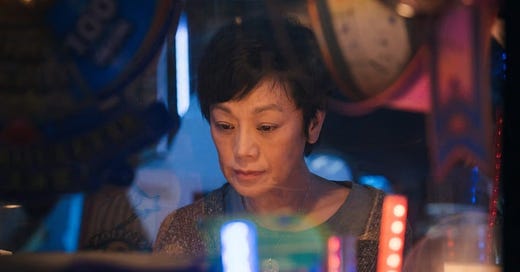A Light Never Goes Out is about finding comfort in mundanity
As a kid, my dad always had this idea that, if I was ever going to realise the value of hard work, it needed to be by doing a shit job and realising how mind-numbing it could be to take the easy route. I started going into his workshop with him on Saturdays and Sundays in the lead-up to Christmas - the time of year when he’d work seven days a week for a couple of months - and I was basically just there to sweep up after him. He was a joiner, and he’d usually be working on either big structural projects, like staircases for public buildings, or more commercial pieces like beds with fancy pop-up TV compartments at the foot. Weirdly enough, I didn’t actually mind doing it.
Sweeping up huge piles of sawdust was satisfying in its own way, and it gave me a bit of space to think while I wasn’t expected to be engaging my brain in anything. My dad was also a bit of a storyteller, and because this was the place where he’d spend quite a big chunk of his time, every little thing was a prompt to tell either a cautionary tale or do a quick stand-up routine. The job wasn’t quite as bad as he’d hoped, and I probably didn’t learn the lesson he was trying to teach until a few years later, but it’s quite a special thing to look back on nonetheless.
Because of what his job entailed, I’m quite lucky to be able to find reminders of him out in the wild from time to time. If I take a certain route back to my mum’s house, I pass a bank in Ilford which my dad made the doors for. It’s quite an old, traditional-style building - the kind that you probably picture first when imagining what a bank looks like, and I suppose that adds to the magic in a way. Although it’s only a couple of doors, it’s something that gives me a reminder of my dad and a reason to talk about him, so it’s special.
Save for some changes in the details, that’s exactly what A Light Never Goes Out is about. Instead of London, we’re in Hong Kong, and instead of furniture and hardware, Biu (Simon Yang) is a manufacturer of the city’s famous neon signs. Following his death, his wife, Mei-heung (Sylvia Chang), is intent on picking up the dream that he left behind. She finds his old workshop and adds her own neon signs to Hong Kong’s skyline.
Anyone who has experienced the loss of either a creative or a tradesperson will be able to relate to the comfort that comes from seeing their work live on beyond them. In my case, and Mei-heung’s, that person fits quite neatly into both categories, but it’s really a universal story that will surely ring a bell for a spectrum of pursuits. Writers, artists, photographers, plumbers, gardeners, and many other professionals all have that quality of longevity in common in one way or another, and A Light Never Goes Out is a celebration of the mark we can all make on the world.




